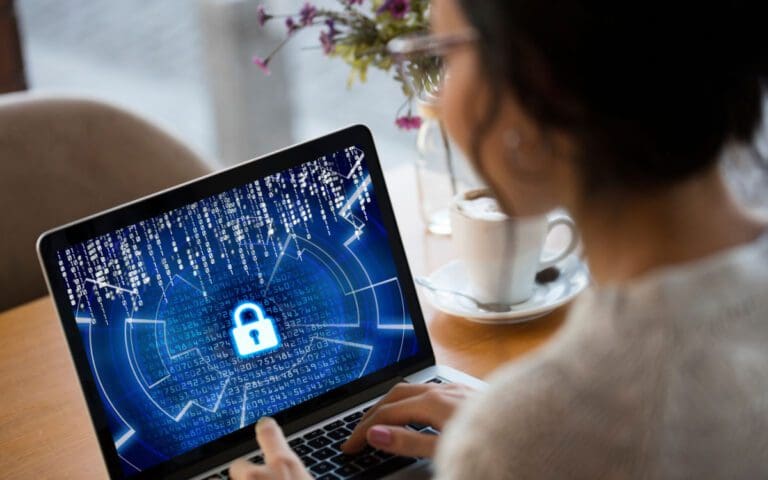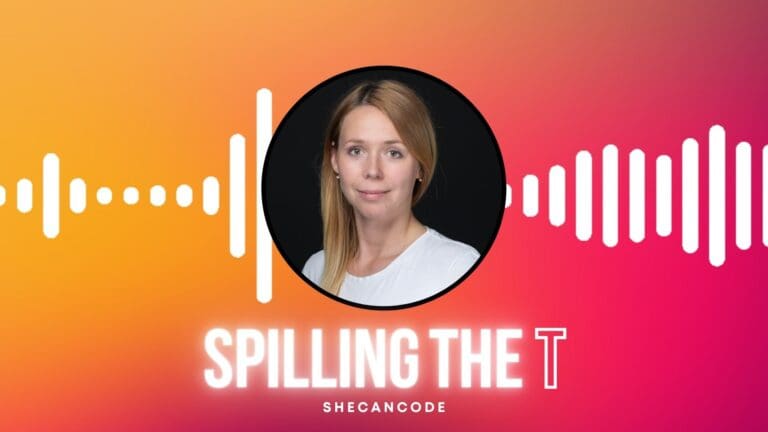hello everyone thank you for tuning in
again I am Katie Bateman the content
director at chican code and today we’re
discussing future cyber security trends
that you should be aware of TV shows and
movies would have us think that cyber
security is all hackers criminal
masterminds and the battle between them
and the good guys but it’s a bit more
than that with employees working
remotely businesses are facing an
increasing battle to keep their data
safe and networks secure to talk us
through cyber security and the trends we
need to know about I’ve got gal
hellemski Chief product officer at plain
ID with me today welcome girl
thank you nice to nice to be here thank
you so much for for joining us can we
kick off uh the conversation with a
little bit about yourself please yes
absolutely so again thank you for
hosting me and I’m I’m girl I’ve been in
the industry for I believe it’s nearly
30 years and I start yeah quite quiet I
yeah well I started the rather early
when I was in the Israeli Army I I
joined the main Computing unit at the
time I did some Computing
um uh science type of studies I was an
instructor for computer programming so a
lot around computers and the then once I
designed that position I started off in
as well uh both both startups I started
working with were focused around
identity and access management
which is which is part of the cyber
security landscape and obviously we’ll
touch on that later on in the discussion
but that’s how if I started my career in
computer programming with very focused
Direction in cyber security identity and
access management in the startup
community team later on I did the work
as a consultant for some time
again that area cyber security identity
and access management and eventually I
came to fund playing ID together with
with my co-founder or NRL and part of
what we do is with the understanding in
the Gap that we have today in the market
and again we will touch on that later on
yes I mean you’re the first person I’ve
had on here that said you
um started your career um in the Israeli
Army and that’s the first first person
I’ve had on down here we hear some
interesting routes into Tech
um and that one’s a new one for us and
what’s there something about Computing
at the time that you know you started in
that area or was there something that
attracted you to it did you see from the
start it was going to be a great career
now actually you know what then that’s
funny I didn’t want to go to computers I
I I really liked physics physics and
Science and that was my direction in
life and I was very upset you know when
you when you joined the Israeli Army you
do all those tests and then they pick
and choose the people to go to the to
the relevant directions and I was
selected to join this um uh this uh this
path uh in in the Army and initially I
wasn’t fully aware of what it meant and
what it required also had to sign up for
quite a lot of years so I wasn’t sure at
that time I would you know I was young I
didn’t I thought of a different career
path but I was very much engaged and it
uh to be in that area it’s it’s like
solving problems eventually that’s how I
saw that you know and that’s what’s so
exciting in Tech the the ability and the
the option to solve so many so many
um and to get the tools to actually do
that uh so so I started I said okay I’m
going to try and I’m going to see how
the world that would lead me and
actually it led me into a very exciting
and great path in my in my life so I’m
happy I did eventually go in that
yeah it’s it’s great to to hear um you
say that because I hear that so often
ladies falling into Tech I fell into the
tech industry lots of people do and it’s
it’s a lovely that you describe it as
you know it’s just a place where you can
solve problems because that’s almost
like a hidden secret isn’t it you know
why don’t more people know that that’s
what your job will be in in the tech
sector and I think we we have a a PR
realize what it will be like
um also working in cyber security
um would be you know a super interesting
um career route uh anyway in in the tech
um start our cyber security chat today
um can you give us a quick summary of
what cyber security is and what it
involves yeah absolutely so actually
it’s build of two votes which are which
you know together they make sense this
is about Security in the cyber space now
think about Security in the real world
right if you want let’s say you want to
go to an airport you have to go through
several layers of of security you have
to prove who you are you have to prove
that you have a ticket to the plane that
you want to access and then within the
plane you can only sit in the seat that
you have purchased and you go from
multi-layers of a verification of who
you are and that you are actually
entitled to do to to be there
additionally in the background there is
a a large portion which you do not see
that verifies over and over again that
that’s where you need to be and monitors
your activities and so on and that is
Security in real life now think about
all of that in the Digital Life in the
cyber space which which is which
basically is more or less of the same
right I want to access let’s say my bank
account in order for me to access my
bank account in the cyberspace my
identity needs to be verified there
needs to be some proof that my bank
account actually belongs to me and
whatever I can do within my bank account
additionally if I’m operating in my bank
account there needs to be continuous
verification that I am still who I say I
am and I that I can do all those actions
so really I think exciting space and and
implementing all those security controls
in the cybal space that’s I will
Yes Yes sounds simple I’m sure it’s not
um but also it must sound um it must be
so uh fast paced and changing because
um criminals must be you know always
trying to try something new so it must
be quite a fast-paced environment to to
absolutely so so what’s so challenging
in cyber security that it needs to be
catching up over and over and over again
with the uh with the new technology and
um in in in that space like uh for
example technology changes from
on-premise type of technology to cloud
and then there are all those data hubs
which are now so commonly used within
the cloud there is movement from Big
monoliths into micro service type of
infrastructure so so many changes and
the security the cyber security space
needs to catch up over and over and over
again actually it doesn’t need to catch
up and that’s part of the challenge that
we are facing it needs to be in it needs
to be there even before because if
you’re releasing a new technology it
needs to have I will security already
um plugged into it if it doesn’t then we
are exposed right so so that’s what
that’s why it’s an ongoing type of
activity that needs to be in mind of all
those involved in technology you need
always to consider the security aspect
of whatever uh whatever you are doing
um must be uh one of um a huge uh issue
for companies to to keep up with and and
to always get on the front foot I’m I
mean that’s that’s one of the issues
that they’re facing what are the cyber
security issues that the other cyber
security issues that businesses are
primarily today I think because or not
not think I I see according to uh to the
notion of migrating from on-premises
type of implementation into Cloud
implementation the trend of walking more
from home supporting more remote
business collaborating more between
organizations we do see that traditional
controls are less relevant and there is
a more requirement to adopt the uh I’ll
call them the newer controls or identity
and access management specifically which
was always there but now it’s more
important why because eventually that’s
where you can Implement security when an
an application or they data or whatever
service it it has access to
you don’t always have those Network
boundaries in place so today you nearly
never have Network boundaries in place
so what do you have you have the
identity you have whatever the identity
brings with it with him and whatever you
can Implement into continuously verify
this is who the identity is and what
they can do and that can also change and
this is really the most important
um issue or challenge companies and
businesses face to day they want to be
more open they want to collaborate more
you want to open your business you want
to enable you want it to be simple but
with that comes more risk and you need
to handle that risk how understand the
challenges which you’ll face understand
what you need to enable and implement
the relevant controls on that space
which you need to have and eventually it
comes down to know the identity
and continuously verify and control the
identity access to the resources that
you want them to have access to that in
my opinion is the greatest challenge
I believe we also see that challenge and
the the importance of that space by all
those Notions of one zero trust identity
First Security or Identity or World
Security even the notion of this term
a list principle same thing right it all
goes comes down to the fact that you
need to know who the identity is you’re
not relying on any network metrics or
anything that is in before but you know
who the identity is it’s not enough
you need to also adjust the identity
access and what that identity can do
based on changing circumstances like
well the identity is accessing from what
the identity is trying to do that all
ties down to the same notion Focus your
security efforts on the identity
and a lot of this um as well you know
businesses would have found themselves
um because you know the pandemic and
suddenly everybody went home
um and and they were working in
different ways and and based on that
should be but should businesses be
implementing training to teach employees
about cyber security because there are
so many more risks nowadays and than
there were before the pandemic yeah
absolutely absolutely in my opinion that
should be like a core training
um in in any organization because today
there is more which is done on the cyber
space employees are what that that
becomes their primary working
environment right and if this is the
primary working environment they need to
be aware of the risks that involves in
walking in this type of environment they
need to be more caution you know it’s
the same it’s the same thing as you
might think when you go to an office you
need to be aware there is a front desk
and you need to present your ID and then
you can access the gate and sometimes
there are fire drills because you need
to know what to do in case of an event
that is the physical world
same thing in your digital world in the
cyberspace this is now your walking
environment so you need to understand
how to act within that cyber environment
what are the risks and if a risk present
itself what should you do how should you
it’s very important especially if it’s
just you at home and you’re not quite
sure what’s happening and a little bit
of training I’m sure people would really
um and obviously we we hear a lot about
um you know that we read the headlines
um and and we we see them um often but
should we as individuals be concerned
I I believe we should in in in several
in several areas so for one US everyone
as an individual has its own personal
assets which are important to to them
right and you want them to be protected
you don’t want to expose whatever you
have in place everyone today operates on
the digital space right so you need to
be able to protect whatever you have and
you have also your information a lot of
information is today converted to
digital you don’t you don’t get every
anything today on paper right you need
to protect that because that is what
builds your identity and you need to be
you need to be aware and you need to be
able to protect that I believe it’s very
important so that’s one aspect to that
the other aspect is we are working in
multiple places and we are supported and
that what builds our economy all those
businesses and industries so yes
obviously as individuals we want that to
cyberproof we we want to reduce attacks
the same as we want that to be done on
the physical world we also want that to
be done to be prevented on the Cyber or
the digital uh landscape I I think there
is a lot of equivalent between our real
world to our digital world and we we
have the same concerns there and even in
the cyber world those are much bigger
they have ma they can have much much
larger effect we need to be aware of
that we need to be caution of whatever
we are doing so yeah absolutely
it’s strange isn’t it you when um you
are nailed it there perfectly about you
know online attacks can have a bigger
effect on you but you’re right because
um to you in person you’re not there you
can’t physically see what’s happening
um we can be quite naive in that sense
that we may don’t protect ourselves as
um as well as we could do and I think we
seem to think you know it’s always
somebody else you know we’ve always
heard a horror story about somebody else
or it’s usually a business
um that gets uh attacked and that maybe
people won’t go for individuals um but
obviously you know any anybody uh it
could happen to anybody at any time
um on that note what can we be doing to
protect our data and privacy
well first of all I think awareness
that’s top priority in order to start
protecting our data in order to start
protecting our privacy and that I think
our challenge is that not everyone
the that notion on a similar level right
you have those who are more involved in
Tech and they have maybe better
understanding and those who are a bit
less involved in Tech and they kind of
try to push that away you know I I’ll
share maybe a funny story I don’t know
will happen to me with my my mother she
she called me one day and she said
um uh someone is someone has texted me
code and can I send it no no you you
can’t do that why are you even thinking
about sending whatever code you get you
get to someone which you don’t
understand you’re not familiar with she
told me well they’ll form the support
team they want to help me no they are
not from the support team they do not
want to help them I mean just think
about that would you give your personal
would you give your I don’t know your
bank credentials to someone no you
wouldn’t do that and it all starts with
awareness anything that is connected to
your identity in the digital space it’s
you don’t give it away never
if it if it if it is attached to an
operation or to a function which you can
do it is connected to your data it
protects your privacy never ever ever
give that away or at least verify with
someone which you rely on what to do and
and and that’s the first step awareness
awareness awareness you need to know
what you’re doing if you don’t know ask
before you do any action yes that’s
great advice ask yes if you’re really
not sure and just ask before you and
double check before you do something and
then have that have that regret I am
that paranoid person that still goes in
um actually you know pays off my credit
card in the bank and I I like to talk to
the ladies in there and and please that
my bank has remained open
um but you’re absolutely right there are
certain things that you would do in
um that you know perhaps we don’t think
about as much when we do enter the
um not all of us at that parent that we
still have to walk in a bank and pay
um are there any other trends that we
should be looking out for
so I believe that because the focus is
going to be more on identity identity
and accessment in general and the need
to to provide more privacy controls then
we are looking into what is called
decentralized identity as it as a trend
that would take us forward it means that
us as individuals would be owning would
be would have the ability to own our
identity our digital identity not just
our physical identity and will we have
who can see what portion of that
identity I believe it’s extremely
important to enable us to move forward
in that in that space which means we can
operate with more confident in the
digital space if we have control over
our identity our personal data and who
we are sharing that data with so this is
yes yes and as we mentioned at the start
of this uh the cyber security Institute
um so it’s just businesses getting on on
careers in this area it is a very
um area of tech why do you think more
women should consider a career in cyber
you you mentioned yourself that you came
into it because you saw it as an
opportunity to solve problems I’m sure
that’s that’s a big reason for for women
yeah well in general absolutely and
generally speaking why not I mean
whenever you ask this question why
should women consider my question is why
not I mean why men are considering to
access this area because it’s exciting
because you learn new stuff because you
have the ability to influence so why not
women I mean we can do just the same
there’s no difference really we we
shouldn’t be afraid to try women are
more afraid to try they are afraid to
fail it’s okay to fail because that’s
the only way you learn you you if if you
don’t fail you don’t you don’t try you
don’t learn and and that’s basically my
message to to any women out there who
who might hear this podcast try it’s
exciting it’s a new space it’s an
evolving in space there are so many
opportunities there yes you can solve
problems yes you can help to implement
Solutions yes you can be at the front of
the technology so much to do in this
space cyber security is really exciting
because you fight crime for a living you
well yeah well so many aspects to it but
yes absolutely it’s exciting Beville
don’t don’t afraid to try
and for our listeners you know if they
were considering a career in this area
where do you think they should they
should get started do they have to be
highly technical can I mean yourself you
took a very interesting route in where
do you think people should get started
well you do need to to start with more
technology-oriented knowledge I think
that it starts in high school
because in high school you should be
um you know even if it’s uh not just
computer science it’s not just computer
even more mathematic and physics like
subjects which are relevant to the um to
both industry I’m not saying that if you
you can’t start a career in cyber
security because there’s so many options
there you just need to say that on that
but I do believe that it starts in high
school and what you may what are your
choices in high school what do you
choose as a direction again don’t be
afraid to try and to go into that career
path I mean if it doesn’t fit you you
can always change but it it’s easier
it’s easier to start in that path and
then change to some other than the other
way around that’s that’s what I believe
I by the way I do um in the where I live
in in Israel right so where I live I do
young girls in high school to go to to
to to to those areas to choose more
mathematic more physics more computer
science in high school just so they will
have the opportunity later on to choose
their career path in that direction as
well they don’t have to if they don’t
like it but they will have the
opportunity the fact is today only a
very small percentage of girls at this
age actually choose to go in that
there’s no real reason why the only
reason is they are more afraid to try
um I love everything you just said there
um as somebody who doesn’t look like
they’ve been in the industry for 30
years to our listeners um I can vouch
that gal doesn’t look like she’s been in
um what was it about physics you did you
get pushed back at school being a girl
that wanted to go into physics or did
you have a teacher that really
encouraged you to take up that subject
well uh both I would say first of all I
had an incredible incredible teacher in
uh she made it also fascinating really
so but still we were only I believe four
girls in a full class of boys in physics
but it was exciting to learn that I mean
I I also did my my uh first degree in
physics and computer science because
that’s what I thought I wanted it was
exciting for me to to learn that and to
you know it’s like discovering all those
understanding uh How the Universe
operates uh but eventually computer
science and what I do today
it’s not physics right but still it’s a
round solving challenges either it’s
around understanding problems and
solving them in a way that makes sense
that makes things simpler actually it’s
much simpler than physics Simon
yeah it’s nice that you describe it as
exciting as well you didn’t
um it wasn’t a negative experience for
you a little encouraged no not at all
but I do agree with you it’s a lot it’s
a lot it has a lot to do with the
teacher that you have because not all
teachers can make things exciting I mean
you can take the boring subject
and have the my teacher in place they
would make it so exciting and the other
yes yes I’ve experienced that
um we’re almost out of time I just
wanted to ask you do you have any advice
for our listeners is there anything that
you wish that you had been told when you
um so primarily to have the courage to
um and don’t afraid to fail it’s just
part of what you do and also you need to
be persistent you need if you have a
and you know what you want to achieve be
persistent it it’s not it not everything
works at the beginning of first try
um so that that would be that would be
my advice know your path in life choose
it well be persistent and don’t be
wonderful that is lovely advice to
anyone because we are already out of
time so thank you so much gal for
joining us today it’s been an absolute
pleasure to chat with you thank you very
much happy to be here thank you for
inviting me thank you for for joining us
and for everybody listening as always
thank you so much for tuning in and we
hope to see you again next time








